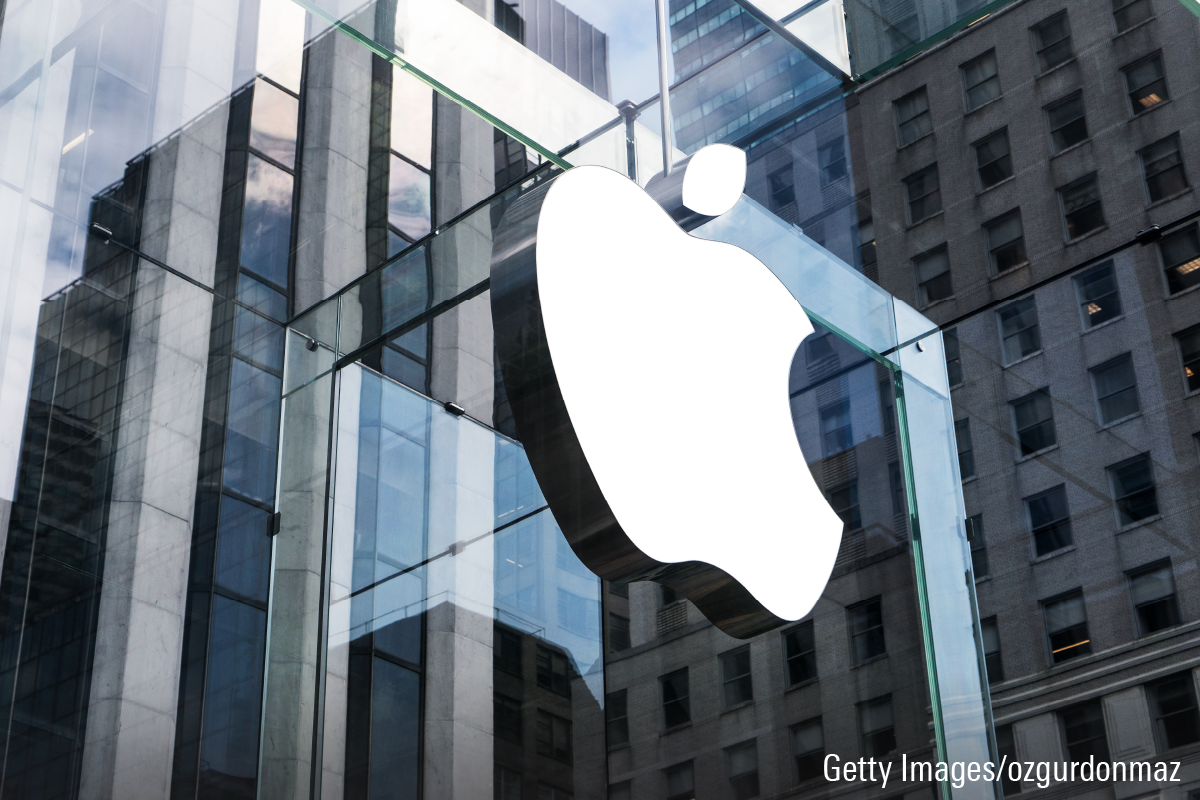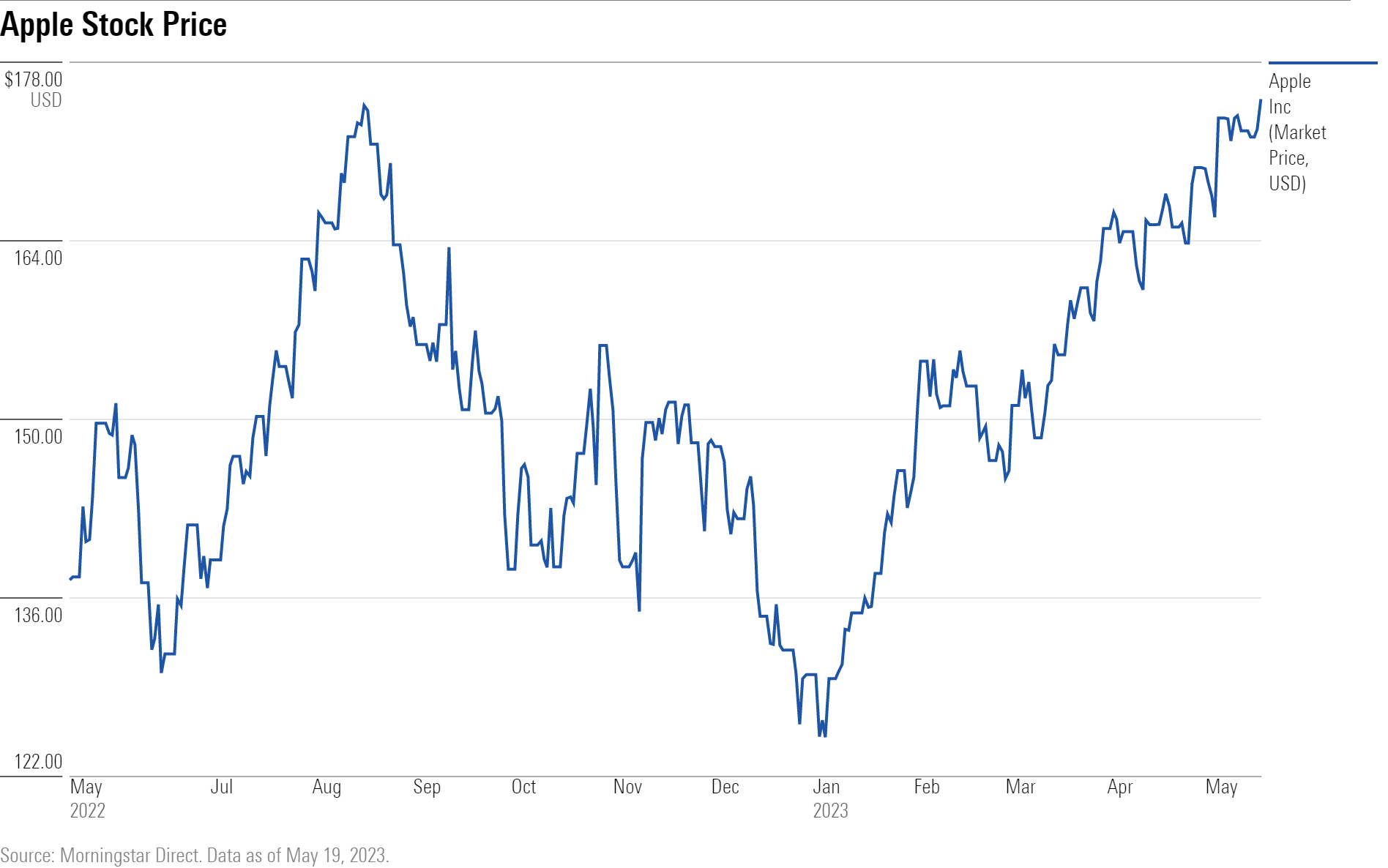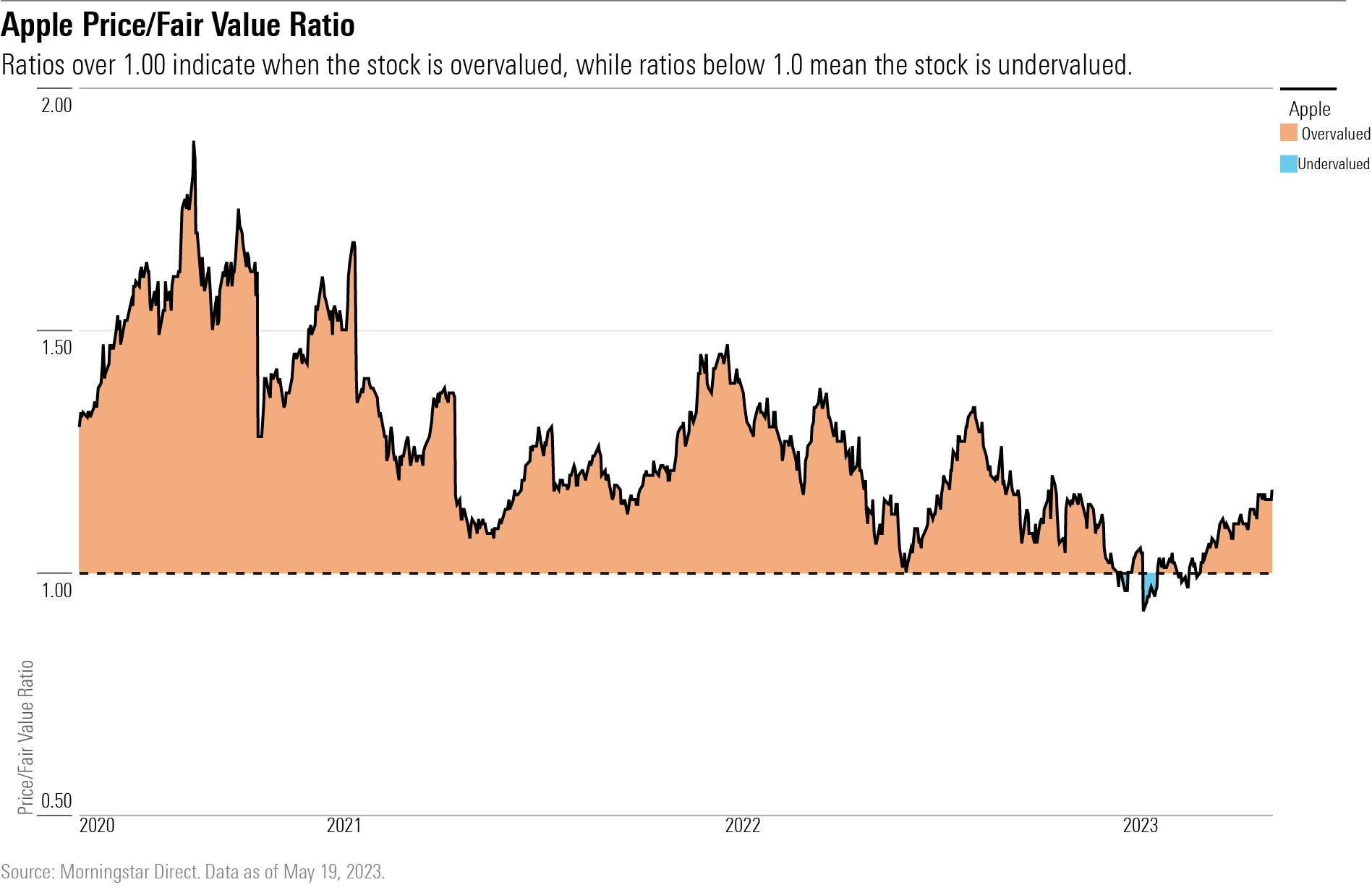Is Apple Stock a Buy, a Sell, or Fairly Valued After Earnings?
Apple’s results topped our expectations, but we’re cautious on the next several quarters.

Apple AAPL released its second-quarter earnings report on May 4. Here’s Morningstar’s take on what to think of Apple’s earnings and stock.
Apple Stock at a Glance
- Fair Value Estimate: $150
- Morningstar Rating: 3 stars
- Morningstar Economic Moat Rating: Wide
- Morningstar Uncertainty Rating: High
What We Thought of Apple’s Earnings
Apple’s fiscal second-quarter results surpassed our estimates, thanks to outperformance in iPhone and services revenue. We anticipated a slowdown in the firm’s hardware products following several years of strong growth related to COVID-19-induced work- and learning-from-home trends, as well as the initial rollout of 5G. Although most segments fell year over year, we were pleased to see the iPhone and services units exhibit modest growth. We remain cautious on the next several quarters for the firm as macroeconomic headwinds persist, though wide-moat Apple should fare better than many of its smartphone peers.
Our fair value estimate remains at $150 per share, and shares appear modestly overvalued at current levels.
Second-quarter revenue of $95 billion fell 3% year over year, with declines in iPad (13%), Mac (31%), and wearables (1%). Mac and iPad faced product launch timing differences and weaker demand. Positively, iPhone revenue grew 2% year over year to $51 billion, thanks to strength in emerging markets like India and what we assume to be higher average selling prices.
Since the iPhone 14 Pro has a superior camera and processor relative to the base iPhone 14 model, we think a richer mix will help offset unit declines in the near term. Services revenue rose 6% year over year to $21 billion, with strength in App Store, Apple Music, iCloud, and Apple Pay. Apple now enjoys over 975 million paid subscribers (up from 935 million last quarter), which we think bodes well for continued services growth as the firm increasingly monetizes its valuable installed base.
Management noted that quarterly sales would have been up in constant currency (500 basis points in foreign-exchange headwinds). Gross margins rose 130 basis points sequentially to 44% thanks to a more favorable product mix. With hardware sales poised to weaken while services revenue stays resilient, we think Apple’s gross margins will stay above 44% for the rest of fiscal 2023.

Fair Value Estimate for Apple Stock
We believe Apple stock is modestly overvalued compared with our $150 fair value estimate, even though it trades in a 3-star, or fairly valued, range.
In fiscal 2023, we expect total revenue to be up 3% thanks to strength in iPhone, wearables, and services sales, partially offset by weaker Mac and iPad revenue following multiple strong years associated with work- and learning-from-home trends spurred by the pandemic. We expect gross margins to normalize around 40% thanks to Apple’s exceptional premium pricing strategy and stable iPhone margins.
Read more about Apple’s fair value estimate.
Apple Price/Fair Value Ratio

Economic Moat Rating
We assign a wide economic moat rating for Apple that stems from the combination of switching costs, intangible assets, and network effects associated with its iOS ecosystem. We think the firm’s moat can be attributed mainly to high customer switching costs, based on a variety of aspects of Apple’s hardware, software, and services. Beyond the iPhone, Apple’s other key hardware products, such as the iPad, Mac, Watch, and AirPods, each fill a computing niche that enhances user experience. Beyond switching costs, we believe Apple’s expertise in hardware, software, semiconductors, and services represents an intangible asset that even the strongest tech firms have struggled to replicate.
Read more about Apple’s moat rating.
Risk and Uncertainty
As the largest publicly traded company in the world by market capitalization, Apple is prone to material competition. Over the course of its iPhone-fueled dominance, Samsung, Microsoft, and Google have taken their best shots at Apple, with fleeting success.
We also suspect that many customers are holding on to their phones longer, as premium devices are more than good enough for today’s needs (web browsing, streaming, social media). Some peers are willing to sell hardware essentially at cost to drive market share and stickiness in other business segments. Should these devices supersede their iOS counterparts, Apple’s devices may be at risk. On the environmental, social, and governance front, the biggest issue we see for Apple is its App Store commission structure, which is facing legal and regulatory scrutiny as the company is accused of using tactics that hurt competition. Apple’s service revenue could be negatively affected if any antitrust rulings go against it.
Read more about Apple’s risk and uncertainty.
AAPL Stock Bulls Say
- Between greater smartphone penetration in emerging markets and repeat sales to current customers, Apple has plenty of opportunity to reap the rewards of its iPhone business.
- Apple’s iPhone and iOS operating system have consistently been top-rated for customer loyalty, engagement, and security, which bodes well for long-term customer retention.
- We think Apple is still innovating with the introductions of Apple Pay, Apple Watch, Apple TV, and AirPods. Each could drive incremental revenue, but more crucially they help retain iPhone users over time.
AAPL Stock Bears Say
- Apple’s decision to maintain a premium pricing strategy may help fend off gross margin compression, but it could also limit unit sales growth, as devices may be unaffordable for many customers.
- If Apple were to ever launch a buggy software update or subpar services, it could diminish the firm’s reputation for building products that “just work.”
- Apple is believed to be behind firms like Google and Amazon in the development of artificial intelligence (notably Siri voice recognition), which could be problematic as tech firms look to integrate AI to deliver premium services.
This article was compiled by Maggie Guidici.
Get access to full Morningstar stock analyst reports, along with data and tools to manage your portfolio, through Morningstar Investor. Learn more and start a seven-day free trial today.
The author or authors do not own shares in any securities mentioned in this article. Find out about Morningstar’s editorial policies.

/s3.amazonaws.com/arc-authors/morningstar/426795a6-50a8-4320-8dea-8c93d2bfd246.jpg)
/cloudfront-us-east-1.images.arcpublishing.com/morningstar/ZM7IGM4RQNFBVBVUJJ55EKHZOU.jpg)
/d10o6nnig0wrdw.cloudfront.net/04-22-2024/t_d910b80e854840d1a85bd7c01c1e0aed_name_file_960x540_1600_v4_.jpg)
/cloudfront-us-east-1.images.arcpublishing.com/morningstar/K36BSDXY2RAXNMH6G5XT7YIXMU.png)
:quality(80)/s3.amazonaws.com/arc-authors/morningstar/426795a6-50a8-4320-8dea-8c93d2bfd246.jpg)